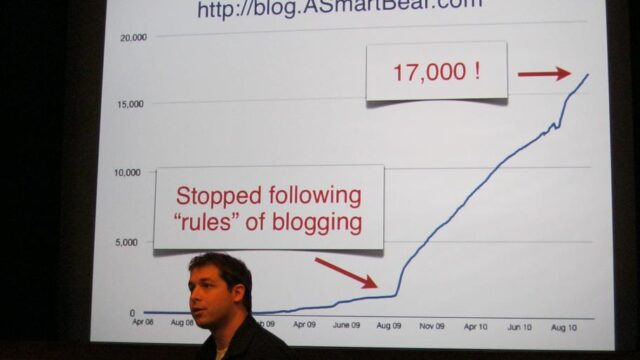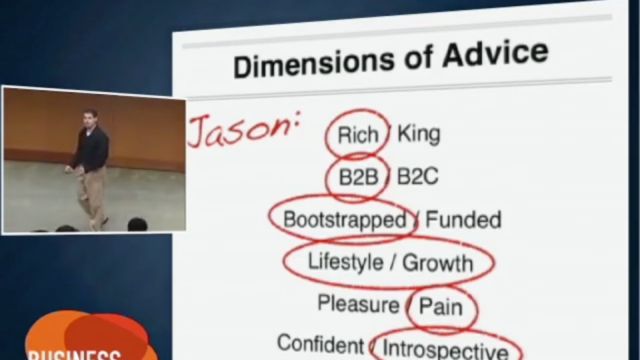We all know there are no shortcuts to success, but that doesn’t stop us from trying to find a magic bullet that will slingshot us to the front of the line. As Gail Goodman said in her 2012 BoS talk, ‘The Long, Slow SaaS Ramp of Death’, these are all just mirages along the pathway to software company profitability.
In his 2010 talk, Smart Bear and WP Engine founder Jason Cohen talks about the proverbial ‘rules of business’ and many varying pieces of advice founders get – often from well-meaning mentors and experts. However, even good-intentioned advice isn’t always the right advice.
Cohen shares some entertaining and illustrative stories as well as some excellent arguments for when (and when not) to take advice from others in his talk, ‘Working Out When to Break the Rules & Ignore Advice’. The biggest takeaway: You should write your own business rules.

For a full version of this talk, including a video recording and transcript, click here.
Table of Contents
How to Break This Rule: Make your own rules.
Rule Worth Breaking #2: You should follow advice when it’s given.
Rule Worth Breaking #3: You should focus on solving simple problems.
How to Break This Rule: Solve specific problems, and don’t be afraid to solve challenging ones.
Rule Worth Breaking #4: You need to hire expert salespeople.
Rule Worth Breaking #5: You shouldn’t make big decisions without substantial data to back them up.
How to Break This Rule: Trust your inexperienced gut.
The #1 Rule of Business: Break all the rules.
Rule Worth Breaking #1: There are rules to success in business. And to succeed, you must follow them scrupulously.
Cohen starts his presentation by telling a story about how he started blogging in 2009.
As a coder and self-professed geek, he knew he didn’t have a great handle on blogging best practices. So he turned to the pros at ProBlogger and Copyblogger – companies well-known for their content publishing expertise.
Both sites preached a similar set of rules – things like ‘keep your content short’ and ‘post more frequently as opposed to less’ – that Cohen followed to a ‘T’. After a year, he had gained about 400 followers. To some, that’s a major accomplishment. Yet it was a disappointment for Cohen: he’d been hoping to reach 1,000 followers after a year.
And in that moment of disappointed reflection, Cohen realised he actually wasn’t enjoying following the rules. He didn’t like writing short, frequent posts that didn’t have a lot of depth or detail. He wasn’t having the effect he wanted and wasn’t meeting his goals. And perhaps most surprisingly, he realised the writing had become a chore.
Cohen wanted to stick with the blog but didn’t want to stick with following the ‘rules’ of the ‘experts’.
‘So, I decided, screw blogging. But instead of just “screw all of blogging”, I’m just going to write how I want to, in whatever form I want, whenever I want, and just ignore all the supposed rules’, he says.
Just two years after creating his own ‘rules’, Cohen had amassed a whopping 17,000 subscribers. He connects this story to building a software company.

‘What does it mean that we have opposite rules, and yet we’re both [the blogging platforms and me] correct? What it means is none of those rules were important – about whether the blog was going to be successful or not. None of them made or broke the blog. Here’s the analogy: None of those things are going to make or break the startup either’, he explains.
How to Break This Rule: Make your own rules.
You set the rules and write the handbook.
‘This is liberating. Because if all those little bits and pieces don’t actually matter that much to whether you’re going to be a success or not – if none of those things matter – that means you get to pick them. It means you can do whatever is easier and whatever comes more naturally to you. You don’t need to live in someone else’s box’.
Cohen goes on to explain that his decision to ‘throw the rule book out the window’ and blog his own way not only garnered him thousands of subscribers in a short amount of time but also allowed him to hire ‘one of the top 5 WordPress people on Earth’. This, he says, is why he blogs.
There are an infinite number of paths to success, and none of them look exactly the same. Cohen advocates for forging your own way and, when it doesn’t make sense to follow the ‘rules’ of the road, make your own.
Rule Worth Breaking #2: You should follow advice when it’s given.
Sometimes, advice is contradictory. ‘For every book that says, “These are the rules”, there’s another book that says, “The best blank – think of a job title here – break all the rules”’, Cohen says.
Advice from trusted sources always comes from a place of good intention. But there’s so much guidance out there that it can be hard to weed through all the noise and determine what’s going to be the best plan of action for your startup. This is especially the case, given how much contradictory advice exists.
Helpful tips are generally given based on someone’s goals, and different goals matter. Add to that, Cohen says, that there are different dimensions of advice, like:
- Having a ‘Rich’ mentality vs a ‘King’ mentality
- Selling B2B vs B2C
- Being a bootstrapped startup vs a funded startup
- Building a lifestyle business vs a growth business
- Pleasure-selling vs pain-selling products
- Being a confident founder and leader vs an introspective founder and leader

Advice, experience, and goals are all relative. Some well-meaning recommendations may be the exact opposite of what you should do in reality.
How to Break This Rule: Ignore advice that comes out of context or that doesn’t align with your goals.
‘Advice has context’, Cohen says. When something feels wrong to you, even when it’s coming from someone who, theoretically, knows what they’re talking about and means well, it’s okay to reject the advice and stick with your own trajectory.
This is particularly true when it comes to how quickly things change in the tech industry. What worked at the start of the dot-com boom doesn’t work today, and what works today likely won’t work the same way ten years from now.
Rule Worth Breaking #3: You should focus on solving simple problems.
In most cases, businesses start out solving a singular problem – or at least a simple set of them – for their customers. After all, focus is everything and, as the saying goes, ‘He who is everywhere is nowhere’.
But depending on your customer base, this adage might not fit your business. As Dharmesh Shah said in his talk about lessons he’s learnt building HubSpot, you should solve for the customer – even when it may seem unfocused to outsiders.
Cohen explains how this idea worked at Smart Bear. ‘We solve a really weird, complex problem. Remember, our customers are big: It’s enterprise software, it’s people like Adobe and Intuit and Cisco and Qualcomm – those are all our customers. And they have these crazy workflow problems. Everything about it is super-complicated because the problem domain for our customers is super-complicated.
‘What this means is, if you’re Adobe, you don’t have a choice but to buy a code review tool from us. But building it is out of the question, it’s so complicated. We can barely get our arms around it! And that’s what we do for a living’, he says.
Cohen goes on to explain that Smart Bear does have competitors at lower price points with different and simpler workflows, but they don’t solve the same problems for customers that Smart Bear can with its complicated systems and custom code building.
For Cohen and Smart Bear, solving simple problems was a bad strategy. Had he made that his goal, the company would likely have been less successful.
Find out more about BoS
Get details about our next conference, subscribe to our newsletter, and watch more of the great BoS Talks you hear so much about.
How to Break This Rule: Solve specific problems, and don’t be afraid to solve challenging ones.
‘All of the other competitors are too simple to match [these companies’] needs. That means we can charge them a lot of money, and it means we have fewer or no competitors at that level. That’s a huge competitive advantage for us’, he says.
There are plenty of examples out there where ‘solving for the customer’ won out over solving simple problems. While this is a great rule for most, it’s certainly not the only way a company can be successful. Solving specific issues – no matter how big or small – is arguably what’s most important. And sometimes, it makes more sense to go big or go home than it does to start small and, as 37signals likes to say, ‘Under-do the competition’.
Rule Worth Breaking #4: You need to hire expert salespeople.
We tend to have certain ideas about the characteristics of developers and salespeople, and those characteristics tend to be quite different. It’s expected that different kinds of people will fill these roles.
But when you’re bootstrapping a company, you’re often forced to wear the proverbial ‘many hats’ and fill all the roles.
When Cohen founded Smart Bear, he was the sole employee for a while and, thus the lead coder and salesperson. ‘No one told me I couldn’t do sales. I decided that I couldn’t’, Cohen says.
Then, one day, a silver-haired ‘sales expert’ walked in the door and told him all the things he was doing wrong: Smart Bear needed a patent to chase away competition and, while they were on the subject, the name ‘Smart Bear’ needed to change because massive enterprise companies weren’t going to buy from a business called Smart Bear. Additionally, the expert insisted they didn’t need to work so hard and should take more time off. For all this advice, the sales guy wanted 50% ownership of the company because he claimed he would take Smart Bear from a $100,000-per-year company to a $100,000-per-month company.
At first, Cohen thought this was a no-brainer. After all, he wasn’t a ‘sales guy’, and he looked young – big companies weren’t going to be interested in buying from him. ‘The only thing I can think of why I was going to do it is because “he’s a real sales guy and I’m not”. I had decided I wasn’t a sales guy’.
But luckily, Cohen made a major sale within days of those discussions – all without the help of, or making the changes recommended by, the so-called expert. He realised he didn’t need to make those changes – changes he knew didn’t feel right from the start – to find success.
‘Oh, you’re not an expert in sales? Well, of course, you’re not an expert’, he says. ‘But you’re not an expert in any of those things that you’re going to have to do in a startup. Not any of them. And yet, you’re going to have to do it. And the minute that you say, “I’m not that kind of person. I don’t know how to do that. I need to defer”, that’s the moment where you start making bad decisions or taking bad advice’, he insists.
How to Break This Rule: If your sales process isn’t broken, don’t try to fix it with someone else’s ‘expert opinions’.
Sometimes, you actually do know better than the ‘experts’. While Cohen chose to ignore one salesman’s suggestions to radically change his company and his processes in the early days of Smart Bear, he actually did take advice from trusted mentors a few years later, when the company was doing very well and making millions in revenue. Unfortunately, it still wasn’t the right direction for Smart Bear and failed miserably.
‘I was told by a lot of people, “Man, if you’re doing this well without a sales process, just imagine how good you’re going to do if you had a real sales process”. So great, that’s a good point. We should have real sales. Besides, why am I doing demos all day long? That’s probably a bad use of my time.
‘So we started doing this stuff, and we had a new mission: That we should be sales-focused, do it in a traditional way, and measure stuff. And this is a long story; it goes on for years. Literally, years we tried this, so I’m not going to go into it because you don’t want to hear that. I can summarize by saying that it was a disaster’, he says with a laugh.
People mean well, especially people you have strong relationships with, like mentors. But sometimes, the process you’ve built is the right one for your company’s success. If something doesn’t make sense for your processes or your company culture, skip it.
Rule Worth Breaking #5: You shouldn’t make big decisions without substantial data to back them up.
Theoretically, this is true. But sometimes, the data simply isn’t ‘there’ to suggest which action you should take, one way or another.
‘This is hard for engineers like me to accept because, again, we’re all Vulcans and we like data, and metrics, and experiments, and evidence, and logic. And that’s how we make our decisions. Or at least that’s how we’d like to make our decisions! But the truth is that you rarely have that much data, and it’s rarely that high-fidelity, especially at the beginning’, Cohen argues.
It takes time to build up enough data to really ‘read’ it and know what works well and what doesn’t. You also have to take into consideration that things change over time, all of which can affect how you might or should make decisions.
You simply can’t always rely on or wait around for data.
How to Break This Rule: Trust your inexperienced gut.
‘Whether or not you’re right, or whether or not you have data, it kind of doesn’t matter. You have to trust that whatever you naturally do is going to have to be the right thing for you’, Cohen says.
He argues that the best course of action is to stick with things you naturally enjoy or excel at. You’ll never be the best at something by following or playing by someone else’s business rules. But when you listen to your own intuition, which gets more accurate with time and experience, you’ll continue to make decisions that work best for your company and your team.
The #1 Rule of Business: Break all the rules.
‘Hopefully, I’ve given you a new set of filters where you’re more comfortable saying, “You know what? I’m going to ignore that and do the opposite, and I’m ok with that. I’m going to stop feeling guilty about it”’, Cohen concludes.
There is no one-size-fits-all approach to founding a startup, and there’s certainly not one set of suggestions that’s going to make sense for everyone in every context. As Cohen teaches, don’t be afraid to write your own rule book and ignore those recommendations that don’t fit your company or your culture. Your startup will be stronger for it in the long run.
Click here to watch Jason Cohen’s full talk and hear more examples from his experience building Smart Bear and WP Engine. You can also find him on X (Twitter) or connect with him on LinkedIn.